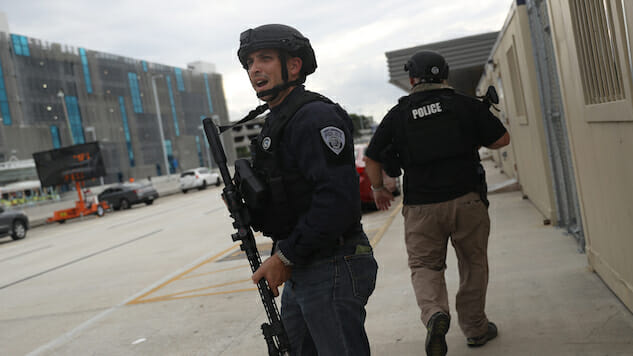Our Gun Problem Is More Than a Mental Health Problem
Photo by Joe Raedle/Getty
On Feb. 2, the U.S. House of Representatives voted to roll back a gun law that would block some people with mental illness from purchasing guns. The law relied on the Social Security Administration to report to the FBI people who were receiving disability benefits for mental health disabilities, which would cause the names of those people to pop on a background check if they tried to purchase a gun. It is likely that the change in the law will sail through the Republican-controlled Senate and be signed by President Trump.
Reactions by gun-control advocates to the change in law tend to emphasize how the law change endangers public safety. As The Hill reported, “Rep. Elizabeth Esty (D-Conn.) accused Republicans of weakening the background check system.” Esty stated, “The House charged ahead with an extreme, hastily written, one-sided measure that would make the American people less safe.”
But is Esty right?
Media Obsession with Mass Shootings
In January, Esteban Santiago, a U.S. veteran with a mental illness and a history of domestic violence, gunned down 13 people in the Ft. Lauderdale airport, killing five. A few weeks ago, Santiago pleaded not guilty to all charges against him.
After the shooting, experts were full of hindsight: how did a man who had voluntarily told authorities that he was psychotic and surrendered his firearm get his firearm back a mere few weeks later (remember, this was before the rollback of the mental health gun law)? Why didn’t authorities pay attention to Santiago’s history of severe physical violence toward his intimate partner, a common indicator of future gun violence? He had a one-way plane ticket along with a gun in his luggage—more indicators that seem to have passed beneath our collective radar. And now we have yet another national tragedy on our hands.
Yet, despite the media focus on mass shootings when they occur, they make up only a minuscule number of the gun deaths in the U.S. each year. According to the CDC, in 2014, 33,599 people died of firearm injuries in the U.S. That same year, according to the comprehensive study by Mother Jones, only 18 people died in mass shootings, including the Ft. Hood and the Isla Vista shootings that year.
This isn’t to say that mass shootings aren’t horrifying events. They are. But these events, and the inevitable debates that follow, distract from what a public health crisis guns really are.
Here’s what I mean.
On the very same day as the Ft. Lauderdale shooting, Jan. 6, BBC Magazine released a story on how Japan has nearly eradicated gun violence completely. According to the story, “only six shots were fired by Japanese police nationwide [in 2015]”—six total shots. Furthermore, “In 2014 there were just six gun deaths [in Japan].”
Compare those six gun deaths to the 33,599 that occurred in the United States the same year. That’s roughly the same number of people that are killed in car accidents in the United States each year, and it accounts for 16.8 percent of all injury deaths. Guns are killing tens of thousands of people in the U.S. every year. They’re a public health crisis.
-

-

-

-

-

-

-

-

-

-

-

-

-

-

-

-

-

-

-

-

-

-

-

-

-

-

-

-

-

-

-

-

-

-

-

-

-

-

-

-








































